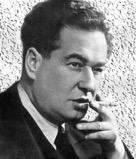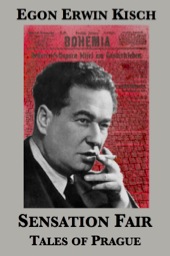
Kisch attended technical university, dropped out, and studied journalism in Berlin. After returning to Prague, he became police reporter for the German-language paper Bohemia from 1906 to 1913. His muckraking features ran under the headline “Roaming Through Prague” and explored the city’s underworld of bars, dives, gambling dens, prostitutes and murderers. His first major scoop was the story behind the sensational forced suicide of Colonel Alfred Redl, intelligence officer in the Austro-Hungarian army, in 1913. A homosexual, Redl had been blackmailed into spying for Russia. Kisch served in World War I and was wounded in action. He kept a diary, later published as Write It Down Kisch! His military experience further radicalized him and in 1918, Kisch participated as a Red Guard in a failed putsch in Vienna. He returned to Prague journalism and theater, but was drawn to Berlin. In Weimar Germany, his “literature of fact” became part of the Neue Sachlichkeit (New Objectivity) cultural movement.
In 1924, his collection of pieces Der rasende Reporter (The Raging Reporter) became a bestseller, followed by many other books of reportage from Europe, North Africa, the Soviet Union, China, and the U.S. The Nazis arrested Kisch, a Communist and a Jew, in 1933 and deported him to Czechoslovakia. His books were banned. That year, he wrote Tales from Seven Ghettos, accounts of Jewish communities from the Thirty Years’ War until the 1930s. Kisch was himself a secular Jew whose family claimed descent from Rabbi Loew, the Maharal of Prague. Kisch inspected the attic of Prague’s Old-New Synagogue for traces of the Golem.
In 1934, he sailed to Australia for an anti-war congress, was denied entry, but jumped off the boat, and broke his leg. The “Kisch Affair” became a cause célèbre, raising Australian awareness of Nazism. Kisch wrote it up in Australian Landfall before going to Spain to report on the Spanish Civil War. In 1939, Kisch fled to New York, was detained at Ellis Island and denied residence in the U.S. He and his wife Gisela spent the war in Mexico City where he completed his memoir Sensation Fair as Stefan Zweig was writing The World of Yesterday in Petropolis, Brazil. Unlike Zweig, Kisch lived to see Nazism defeated. In 1946, he returned to his birthplace a hero. He died in Prague in March of 1948.
Click on the cover for details about the eBook:




